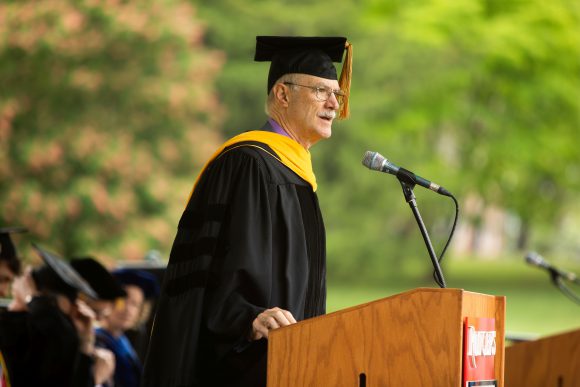
Dean of Academic Programs Rick Ludescher.
EDITOR’S NOTE: Rick Ludescher, dean of academic programs, has served as Master of Ceremonies of the SEBS Convocation since 2012. Following a one-year sabbatical, Rick will return to full-time teaching as a professor in the Department of Food Science, where he began as an assistant professor in 1988.
This is my last Convocation as academic dean, as I will be returning to the faculty on July 1. I thus want to take advantage of the opportunity to give you graduates a word of advice.
Be true, to yourself and to all others.
Be true, to yourself and to all others.
Let me unpack this “word” of advice, letting you know what I mean by the phrase. Then, of course, you will repack it yourself, making it meaningful to you. Or not, as the case may be.
Be true.
For truth is central to what we do here. We faculty are scholars steeped in specific disciplines of the land grant tradition: landscape architecture, microbiology, environmental science, food science. Our disciplines each strive for truth: about how to design the built environment, about the role that microbes play in human health, about chemical and physical pollution, about keeping food safe. And through our courses and programs of study, we have asked you to join us in these pursuits, giving you, on your own, the ability to judge truth in the world. We have done this by compelling you to satisfy learning goals and major requirements. Forgive us if we failed—only occasionally, I hope—to do this well. But well done or not, we have always striven to show you what we, at least, consider sure paths to truth and knowledge. Keep these paths in mind as you make your way in the world. We ask no more of you.
(Be true) to yourself.
The phrase “know thyself” was inscribed at the entrance to the ancient Temple of Delphi—in Greek, of course. But whatever the language, whatever the discipline, the search for truth begins at home. To be true to yourself, you must examine yourself. You must evaluate your assumptions, your prejudices, your biases. You must criticize your arguments, your rationales, your justifications. You must question your judgements, your decisions, your votes. For it is only through doubt that you can test your views to determine if they are true or merely ‘truthy’. This process is essential for your own integrity, but it is also essential for the integrity of our communities. As Polonius said, “To thine own self be true. And it must follow, as the night the day, thou canst not then be false to any man.” Or to any woman.
(Be true, to yourself) And to all others
For you must also be true to other people, to other living things, to our natural world, and to the universe at large. For only by understanding the truth of the world can you decide how best to act in the world. To know what laws are just, what regulations are necessary, what privileges are appropriate. To know what your country should do about immigration, about taxation, about climate change, about how to lead a righteous life.
We know you are ready to take your place in the world. As you find your way, do your best. That is all we ask. It will be enough.

